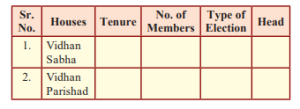Questions Answers For All Chapters – Civics Class 8
Solutions
The State Government
Q 1. Choose the correct option and complete the statements.
(1) The Winter session of Maharashtra Legislature takes place at …………. .
(a) Mumbai
(b) Nagpur
(c) Pune
(d) Aurangabad
Answer: The Winter session of Maharashtra Legislature takes place at (b) Nagpur.
(2) The …………… appoints the Governor.
(a) Chief Minister
(b) Prime Minister
(c) President
(d) Chief Justice
Answer: The (c) President appoints the Governor.
(3) The right to summon the state legislature lies with the ……………
(a) Chief Minister
(b) Governor
(c) President
(d) Speaker
Answer: The right to summon the state legislature lies with the (b) Governor.
Q 2. Complete the table.
Answer:
| Sr. No. | Houses | Tenure | No. of Members | Type of Election | Head |
|---|---|---|---|---|---|
| 1. | Vidhan Sabha | 5 years (unless dissolved earlier) | 288 | Direct election from territorial constituencies | Speaker |
| 2. | Vidhan Parishad | Permanent body; one-third members retire every 2 years | 78 | Indirect election from various constituencies and nomination by Governor | Chairman |
Q 3. Write short notes on.
(1) The Governor
Answer: The Governor is the nominal head of the state, similar to the President at the central level. The Governor is appointed by the President and holds office during the pleasure of the President. The Governor has legislative powers such as giving assent to bills passed by the state legislature, which converts them into laws. The Governor has the right to summon the state legislature and can issue an ordinance when the legislature is not in session but there is a need to make a law.
(2) Functions of the Chief Minister
Answer:
- Creation of the State Executive – The Chief Minister forms the Council of Ministers after proving a majority. The Council includes representatives from various regions and social groups.
- Distribution of Portfolios – The Chief Minister distributes portfolios based on political experience, administrative skills, awareness of public opinion, and leadership qualities.
- Coordination between Ministries/Departments – The Chief Minister ensures cooperation among different departments and resolves conflicts to ensure smooth governance.
- Leader of the State – The Chief Minister leads the state, makes policies, and works for the welfare of the people.
Q 4. Answer the following in brief.
(1) Enumerate the functions of the Speaker of the Vidhan Sabha (Legislative Assembly).
Answer:
- Supervises and guides the proceedings of the Vidhan Sabha.
- Prepares the order of business.
- Ensures the proceedings of the House are carried out in a disciplined manner.
- Can suspend members for misbehavior or misconduct.
- In the absence of the Speaker, the Deputy Speaker takes over the responsibility.
(2) Why did the Constitution adopt a federal system for India?
Answer: India has a large geographical area and a multicultural population with diversity in language, religion, and regional characteristics. It would have been difficult to govern the country from a centralized place. Therefore, the Constitution adopted a federal setup, forming states based on linguistic reorganization to make governance more effective.
(3) What are the considerations of the Chief Minister while allocation of portfolios?
Answer:
While distributing portfolios, the Chief Minister considers:
- Political experience of the ministers.
- Administrative skills of the ministers.
- Awareness of public opinion.
- Leadership qualities of the ministers.


Leave a Reply